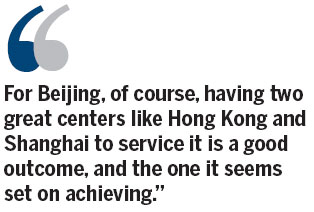Don't take aspiring SH lightly
Updated: 2013-10-04 07:13
By Kerry Brown(HK Edition)
|
|||||||
The political future of Hong Kong attracts much attention now, with changes under the Basic Law due to be implemented in 2017. But while the challenges in this area have been widely discussed, perhaps the most difficult transformation will be in a different area - the economy.
Hong Kong exists at the heart of the world's most dynamic economic region, and the one that promises the most growth in the coming decades. It has a good story to tell about its economic performance. In 2010, Hong Kong's stock market was the seventh largest in the world, and the third largest in Asia. By the end of 2010 it had 1352 listed companies with a market capitalization of $2.39 trillion. Hong Kong is one of the leading asset management businesses in Asia, with $1 trillion under management by the end of 2009. It is also the major source of capital flows into the Chinese mainland and the main place in which State-owned companies make their initial listing when internationalizing.
With the creation of a Pilot Free Trade Zone in Shanghai, however, something significant has happened. At the moment it might be more symbolic than real. But it would be worth pausing to think about what this move by Shanghai might mean. The rivalry between the two places is legendary. According to the Financial Times in 2012, Hong Kong is the city that stands to lose the most from an ascendant Shanghai. An article by Edgar Cheng, former chairman of the Hong Kong Stock Exchange, titled "Hong Kong and Shanghai Can Rise Together" in 2010 articulates these fears. "There is a palpable nervousness in Hong Kong these days about the rise of Shanghai. Already the main domestic financial center in the world's most dynamic economy, Shanghai has an unconcealed aspiration to regain its position on the international stage."

The message for Hong Kong from Shanghai's recent activity is that it cannot, and must not, rest on its laurels. We are used to hearing economists like Stephen King of the HSBC tell Europe and the US that they have to prepare for a world which is more competitive, and in which embracing 2 billion new consumers and their aspirations in Asia has to be a fundamental part of their strategy. But despite being part of the region, Hong Kong too has to prepare for a time when it is up against serious competition from its neighbors. This looks unlikely now. But we must never rule out the unexpected happening. How many foresaw the explosion of China's GDP after entry to the World Trade Organization in 2001 to the collapse of financial markets from 2008?
Hong Kong has to see a future where it specializes more, identifies core competencies, and thinks of strategies where it can leverage its proximity to the aspirations of a newcomer such as Shanghai, and not try to compete with them. It has to take Shanghai's bid for international status seriously, because policy-makers in Shanghai and Beijing do. And it has to come to terms with a day when Shanghai will be seen as the main gateway into the all important domestic market for goods and services on the mainland.
This idea is not a new one. It was prefigured by Chen Yuan, then deputy governor of the People's Bank of China, speaking in the UK in 1996, who said that Shanghai and Hong Kong could have complementary and mutually reinforcing relationships as financial centers. The two signed a Memorandum of Understanding Concerning Advancing Hong Kong Shanghai Financial Cooperation in 2010. According to the then financial secretary K.C. Chan, "RMB internationalization could not succeed without the support of Shanghai, which has the largest pool of onshore liquidity and is the recognized onshore RMB business center." He described Shanghai and Hong Kong as "twin engines" which are "in the process of internationalization of China's capital market."

For Beijing, of course, having two great centers like Hong Kong and Shanghai to service it is a good outcome, and the one it seems set on achieving. But the likeliest way for this to be sustainable is for Hong Kong to deepen its partnership with Shanghai in the services and finance sector, and create a framework in which both are able to say they represent parts of the same story. It may be that a large part of Hong Kong's competitive future will be linked to its political development. And it has to prepare for measures by Beijing that support Shanghai, sometimes seemingly at its expense. The one thing Hong Kong cannot do is take Shanghai's aspirations lightly.
A future in which Hong Kong and Shanghai work closer will, in the long term, be in Hong Kong's interest. With the right strategy, the world is big enough for both these major centers.
The author is professor of Chinese Politics and director of the China Studies Center at the University of Sydney. He is team leader of the Europe China Research and Advice Network funded by the European Union, and an associate fellow of Chatham House, London.
(HK Edition 10/04/2013 page9)